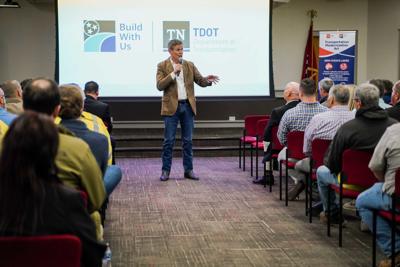Gov. Bill Lee’s Transportation Modernization Act completed its passage through the Tennessee General Assembly on Thursday, looking nearly identical to the way it started. The multibillion-dollar plan will affect the state’s approach to infrastructure for decades to come.
“It’s time to do something about the way we address our infrastructure,” said Rep. Dan Howell (R-Cleveland) while presenting the bill on the House floor.
The core of the legislation centers on freeing up the state to make use of public-private partnerships in building “choice lanes,” which critics have taken to referring to as toll lanes. These choice lanes would be built by private companies on existing highways, giving drivers the option of paying a fee in exchange for theoretically avoiding traffic. Advocates for the bill argue that this would not only open up a new stream of revenue, but also free up the Tennessee Department of Transportation’s limited resources, allowing the department to devote its time to rural projects.
From the time the plan was first presented by the governor in January, the proposal has received bipartisan support, as well as bipartisan criticism. The bill squeaked through the Senate Transportation Committee on a 5-4 vote, with three Republicans joining Sen. Heidi Campbell (D-Nashville) in voting against the bill.
“We have this triple A bond rating, and if there's ever a time to use it, this would be one of those times,” Campbell tells the Scene, referring to the state's strong status according to credit rating agencies. The governor has touted the lack of new debt or an increase to the gas tax as selling points for his plan. “If it's a profitable endeavor for private entities,” says Campbell, “then surely it would be a profitable endeavor for us.”
Early on in the legislative session, Campbell was open to the bill despite having some concerns. But she says as she has grown more familiar with the legislation, her concerns have deepened, mainly surrounding how the bill treats Nashville. Critics of the proposal were quick to point out that of the $3 billion proposed, Nashville and Middle Tennessee would receive the least funding per capita under the current allotments.
“Basically we're getting double charged,” says Campbell, expressing a common concern among critics that funding for rural projects will come out of the pockets of urban drivers through the choice lanes, on top of the taxes residents are already paying. “If you look at other privatizations endeavors in this state — like, CoreCivic comes to mind. They don't go well. And I am very concerned about putting taxpayers on the hook for that component of it."
Campbell was one of five senators to vote against the bill when it passed on the Senate floor on March 20. Sen. Jeff Yarbro (D-Nashville) and Minority Leader Raumesh Akbari (D-Memphis) both supported the bill but expressed concern that it was not ambitious enough to address the state's infrastructure needs.
Protesters rallied against gun violence at the Capitol on Thursday, and the ensuing chaos led Republican leaders to bar most debate on the House floor.
Six amendments were tabled during the session, most of which were proposed by Rep. John Ray Clemmons (D-Nashville), who started with an impassioned speech pleading with his peers to vote positively on an amendment to help expand Amtrak in Tennessee.
“Amtrak wants to be in Tennessee,” said Clemmons. “They are practically begging us to take their money, and invest it and restart intrastate passenger rail service, which could be used for interstate passenger rail service.”
TDOT sent a letter to U.S. Department of Transportation late last year expressing interest in expanding Amtrak throughout Tennessee. But with grants being competitive, advocates for passenger rail expansion have argued that TDOT needs to be doing more to secure federal funding.
“This isn’t asking us to spend a bunch of money,” said Clemmons. “This is asking the state of Tennessee, requiring the department to work with the federal government. … This shouldn’t even be controversial.”
Clemmons argued that having Amtrak lines between major Tennessee cities, and even connecting to Atlanta, could bolster the economies of not only urban cores but also rural counties.
The amendment failed, and the act passed the House on a 78-12 margin. It now makes its way to the governor's desk.





